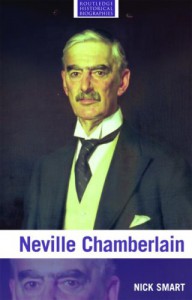A damming portrait of a vain leader

In assessing blame for the failure to confront Adolf Hitler in the years leading up to the outbreak of war in 1939, the umbrella-bearing figure of Neville Chamberlain has always been one of the main targets. Virtually from the moment of his resignation and succession by Winston Churchill Chamberlain became the target of much criticism for his efforts to appease Nazi Germany instead of challenging them. Yet over time a number of biographers and historians have sought to qualify such damming judgments, emphasizing Chamberlain's lack of better options and his efforts to promote rearmament, with appeasement offering a way to buy time rather than provide a permanent solution.
Nick Smart is having none of this. His biography of Chamberlain is a scathing assessment of an unpleasant man. In it he describes the course of Chamberlain's life, from his childhood to his failed sisal plantation in the Bahamas, then back to Birmingham for greater success in business and politics. The Chamberlain that he details is vain and self-pitying, with an unjustifiably high opinion of his own abilities. Much of his eventual success is due to his family name, though Smart gives him due credit for his organizational and party-building skills. Yet Chamberlain's gifts did not extend to character judgment, and Smart makes a convincing argument that his practice of personal diplomacy, as far-sighted as wit was, was based on a self-regard that deprived him of the support of the Foreign Office and the politicians who led it.
Much of what makes Smart's argument so persuasive is its consistency, as his description of Chamberlain's flawed character in the early chapters bears fruit when discussing his failings in the political arena. Occasionally the repetitiveness of Smart's negative description can be grating, but overall this is a lively and engaging study of one of the most controversial British prime ministers of the twentieth, one who deserves at least our understanding if not our sympathy.







 6
6
 2
2